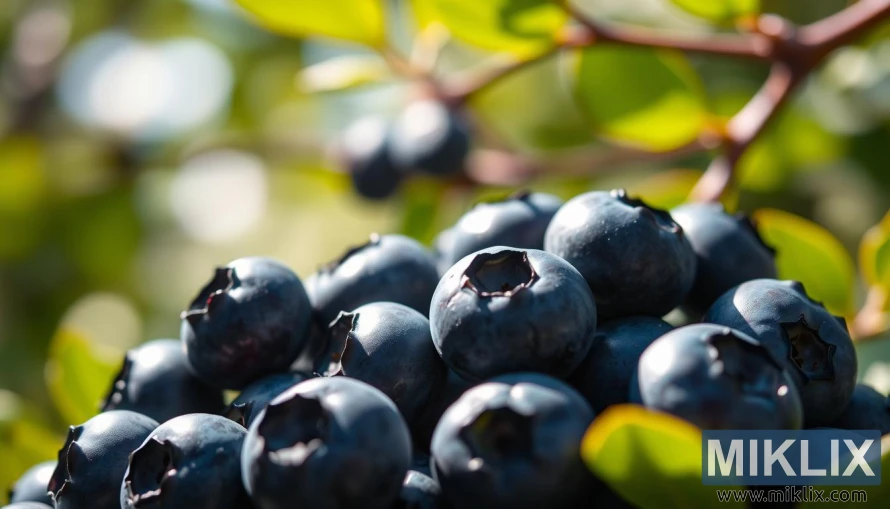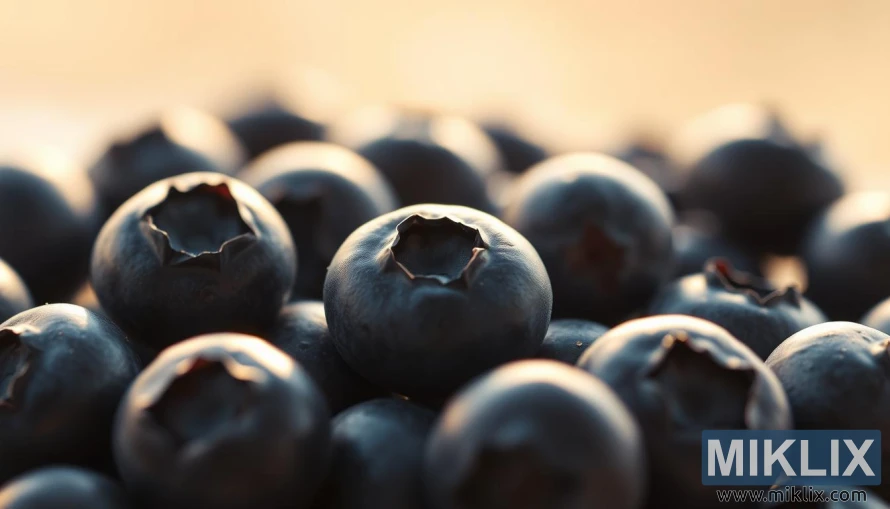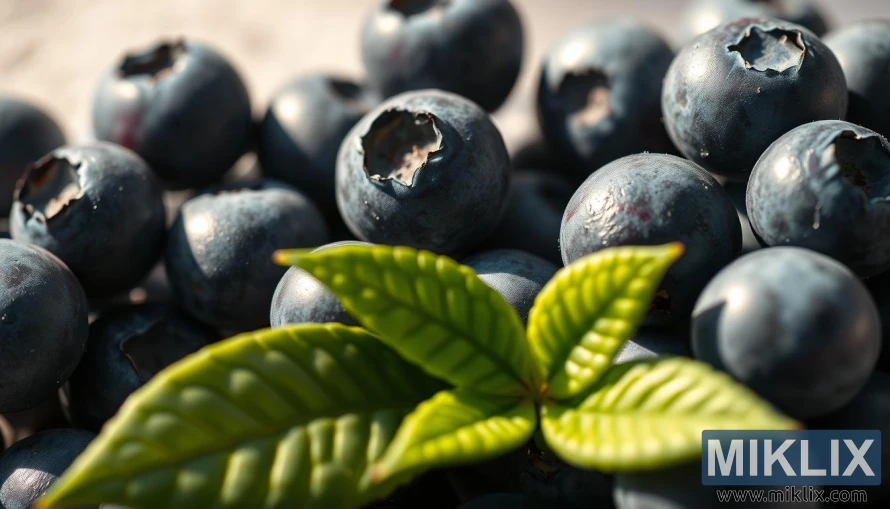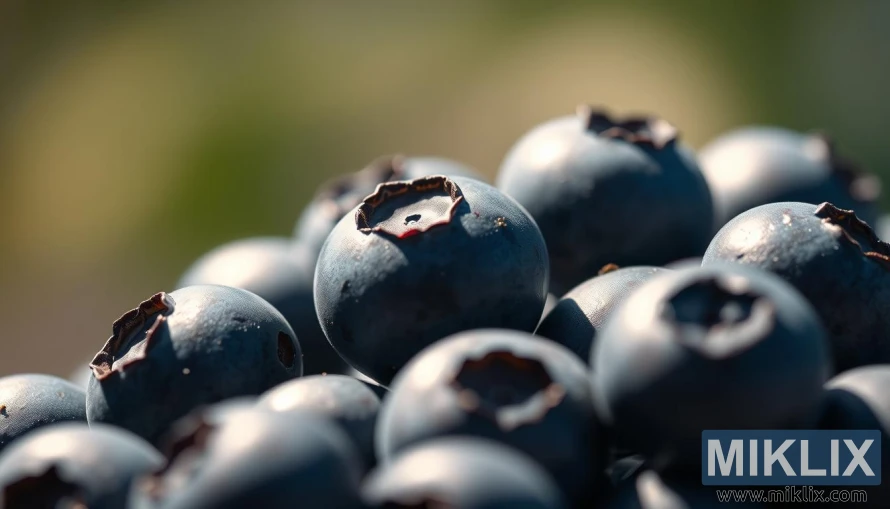Blueberries: Nature’s Tiny Health Bombs
Published: March 29, 2025 at 12:17:45 AM UTC
Blueberries are known as superfood berries for a reason. They are small but full of vitamins, fiber, and antioxidants. Studies show they can lower heart disease risk and improve brain function. They also help control blood sugar. Their health benefits are backed by science, making them a key part of a healthy diet.
Key Takeaways
- They’re the top antioxidant-rich fruit, linked to heart and brain health.
- Regular intake may reduce heart disease risk by up to 34% in some studies.
- Blueberry tea offers zero calories and has benefits for blood fat.
- Research ties them to improved memory, blood sugar control, and gut health.
What Makes Blueberries a Superfood?
Superfoods are foods packed with nutrients that improve health. Blueberries are called a superfood because they're full of vitamins, antioxidants, and fiber. They're also low in calories.
Blueberries have a special mix of nutrients. Their deep blue color comes from anthocyanins, which fight inflammation. They also have fiber that aids digestion.
Studies show eating blueberries 3+ times a week can lower heart attack risk by 32%. Their antioxidants also slow down brain aging, acting as a natural shield against aging.
Blueberries are low in sugar and have a low glycemic index. This makes them good for managing blood sugar. They're also easy on sensitive stomachs. Every bite is a health boost.
Whether you choose frozen or fresh, blueberries add nutrition without extra calories. Their superfood qualities make them a simple way to nourish your body.
The Nutritional Breakdown of Blueberries
Blueberries are a low-calorie fruit full of important nutrients. A 100-gram serving has just 57 calories, 2.4 grams of fiber, and many vitamins and minerals. They are 84% water, which makes them hydrating and filling without too many calories.
- Key vitamins: Vitamin C, vitamin K, and vitamin A.
- Minerals: Manganese, potassium, magnesium, and small amounts of calcium and iron.
As a low-calorie fruit, blueberries offer many benefits. Their vitamins and antioxidants help boost immunity and bone health. The fiber they contain aids digestion, and their low glycemic index is good for blood sugar control. Compared to most other berries, blueberries have a high nutrient density.
Blueberries are a great mix of taste and nutrition. Their natural sugars are balanced with fiber, preventing blood sugar spikes. With such a good calorie-to-nutrient ratio, they're a great choice for a healthy diet.
Powerful Antioxidants in Blueberries
Blueberries are full of blueberry antioxidants, which fight off free radicals. These antioxidants help protect against aging and diseases. The key to their power is anthocyanins benefits, the pigments that make blueberries blue. They work at a cellular level to shield your body from damage.
Anthocyanins in blueberries are more powerful than many other fruits. For example, highbush varieties have 387 mg per 100g, while lowbush types have 487 mg. These antioxidants don't just protect cells; they also reduce inflammation. Studies show eating them daily for a month can improve blood flow and heart health. Long-term eating lowers hypertension risk by 10%.
- Anthocyanins help improve memory and brain function in older adults.
- They reduce LDL cholesterol and boost HDL in diabetics.
- Regular intake correlates with a 26% lower risk of type 2 diabetes.
Cooking can reduce some antioxidants, so eating them fresh is best. Whether on oatmeal or in smoothies, blueberries are a tasty way to fight oxidative damage. Their natural defense against free radicals makes them a simple yet powerful addition to any diet.
Blueberries and Heart Health
Heart disease is a big killer in the U.S., but blueberries can help. They are packed with nutrients that support heart health. Studies show they can lower blood pressure and improve cholesterol levels.
- Blueberries blood pressure: Active compounds help relax blood vessels, easing hypertension risks.
- Cholesterol management: Daily intake boosts HDL (good) cholesterol while lowering LDL (bad) and triglycerides.
- Vascular support: Improved blood flow and vessel flexibility reduce strain on the heart.
A 2024 study found daily blueberries improved blood vessel dilation in just 30 days. For diabetics, a 2023 trial showed significant LDL and triglyceride reductions. The USDA recommends one cup daily—enough to reach heart-protective anthocyanin levels.
Even weekly consumption lowers cardiovascular mortality risk. Pairing fresh or frozen blueberries with a balanced diet strengthens these effects. Prioritize whole berries over juice, as studies show inconsistent results with extracts. Small steps like adding a cup daily can make a measurable difference in protecting your heart’s health.
Brain Health and Cognitive Benefits
Blueberries are great for blueberries brain health because they help with memory and focus. They have antioxidants that fight oxidative stress, which can cause brain aging. A 2023 study found that eating blueberry powder daily improved memory in older adults.
Regularly eating blueberries may slow down cognitive decline by up to 2.5 years. This was seen in a study of 16,000 women.
- Anthocyanins in blueberries enhance communication between brain cells.
- They reduce inflammation linked to Alzheimer’s and Parkinson’s risks.
- Key compounds like IGF-1 boost neuroplasticity, aiding learning and memory.
Studies show blueberry juice can improve memory test scores by 30% in 12 weeks. Even a small amount (25g powder) daily can reduce DNA damage, protecting brain cells. These cognitive benefits of blueberries are good for all ages, from kids to seniors.
As a memory improvement fruit, blueberries support brain blood flow and neural signaling. Try adding them to yogurt, smoothies, or snacks for a natural brain boost. Science backs up the idea that blueberries work best with a low-fat diet. Make your mind healthier with this easy and tasty addition to your meals.
How Blueberries Support Digestive Health
Blueberries are more than just a sweet snack—they're great for your gut. They're packed with blueberry fiber benefits that help your digestive system run smoothly. One cup of blueberries gives you 4 grams of fiber, which helps move waste through your body.
These berries also help your gut's tiny helpers. Studies show they feed good bacteria, like Lactobacillus and Streptococcus. This balance is vital for gut health berries and overall health. Animal studies found that blueberries increased the variety of gut bacteria, even discovering new strains linked to better digestion.
- Blueberry fiber adds bulk to stool, easing constipation.
- Polyphenols in blueberries act as prebiotics, fueling good gut bacteria.
- Lab tests show compounds in blueberries may shield the gut lining from harmful invaders.
Human trials confirm these benefits. A six-week study showed that freeze-dried blueberry supplements reduced digestive discomfort by 20% compared to placebos. Improved gut health can also lower inflammation in your body, easing strain on your heart, brain, and immune system. Adding blueberries to yogurt, smoothies, or oatmeal is an easy way to support your body's internal ecosystem. Your gut—and the rest of you—will thank you.
Blueberries and Blood Sugar Management
Blueberries are a diabetes friendly fruit because of their balanced nutrients. They have a low glycemic index, helping keep blood sugar levels stable.
Their fiber content is 4 grams per cup, which slows down sugar absorption. This makes them perfect for blueberries blood sugar control. Even with 22 grams of carbs per cup, their fiber and antioxidants balance out the sugar.
- Anthocyanins boost insulin sensitivity improvement, aiding glucose uptake in muscles
- Study results show blueberry-rich diets reduce fasting glucose levels in prediabetes patients
- Lab research links regular consumption to 14-24% reductions in insulin resistance markers
Clinical trials show promising results. A 6-week study found obese adults had 12% better insulin sensitivity after daily blueberry smoothies. Animal studies also show reduced abdominal fat and improved glucose tolerance.
Even small servings—like ½ cup (42 calories, 11g carbs)—bring these benefits without added sugars. For those managing diabetes, blueberries are a nutrient-dense option. Pair them with protein-rich foods like Greek yogurt to further stabilize blood sugar levels.
Their natural sweetness makes them a smart swap for processed snacks. This supports long-term blueberries blood sugar control.
Anti-Inflammatory Properties of Blueberries
Chronic inflammation is linked to diseases like arthritis and heart disease. Blueberries are a type of anti-inflammatory berry. They contain anthocyanins that fight this harmful process. Their antioxidants block inflammatory pathways, reducing markers like CRP and IL-6. This makes them one of the top foods for fighting inflammation.
A 24-week study with 150 patients showed blueberries cut CRP levels and other markers. In mice on high-fat diets, blueberries eased inflammation and reduced hypertension. Compounds like malvidin and chlorogenic acid target enzymes like Nox4, lowering harmful ROS levels. Their polyphenols boost antioxidants like CAT and SOD, strengthening cellular defenses.
As obesity rates near half of U.S. adults by 2030, blueberries offer natural support. Their anthocyanins reduce fat tissue inflammation linked to conditions like diabetes. Studies show blueberry extracts lower liver inflammation markers like TNF-α. Adding them to meals helps manage chronic inflammation without harsh medications.
Blueberries have a dual effect—reducing inflammatory markers while boosting antioxidants. This makes them a simple yet powerful addition to anti-inflammatory diets. Their unique phytochemicals work together to protect cells and tissues. They are nature's answer to everyday inflammation.
Eye Health Benefits from Regular Blueberry Consumption
Blueberries are an eye health fruit with compounds that support blueberries vision health. Their antioxidants, such as anthocyanins and vitamin C, protect eyes from damage. This damage is caused by oxidative stress. Regular intake may reduce risks linked to aging vision issues like macular degeneration prevention and cataracts.
- Anthocyanins in blueberries strengthen blood vessels, improving oxygen flow to the eyes.
- Vitamin C (25% of daily needs in half a cup) lowers cataract risk by 18%, per the American Journal of Clinical Nutrition.
- Pterostilbene in blueberries reduces inflammation, easing dry eye symptoms affecting over 16 million Americans.
Studies show blueberry anthocyanins speed up retinal recovery after eye strain, boosting night vision. A 2016 study found these compounds protect corneas from oxidative damage. Regular consumption of 50g daily may also improve blood flow, reducing glaucoma risks tied to poor circulation.
Incorporate half a cup of blueberries daily into smoothies or snacks. Pair with other eye-healthy foods like spinach or almonds for maximum benefits. While blueberries aren’t a cure, their nutrients create a protective shield for long-term blueberries vision health.
Weight Management and Blueberries
Blueberries are a natural way to help manage your weight. They are a low calorie and high fiber berry, which helps you feel full for longer without overeating. This makes them a great choice for a satiety promoting fruit.
Studies show that eating blueberries can help you eat less. This is because they make you feel full longer. This can help you eat more mindfully.
A study with 40 overweight adults lasted 8 weeks. Both groups lost weight, but those eating blueberries kept more muscle. The fiber in blueberries slows down digestion, keeping blood sugar stable and reducing hunger.
The anthocyanins in blueberries might also help you burn more fat when you exercise. In a trial, athletes burned 19-43% more fat after eating blueberries.
- Low calorie content: 84 calories per cup with 12-18% daily fiber
- Craving control: 8-week study saw reduced sweet/savory cravings
- Metabolic support: Anthocyanins may improve fat burning during workouts
Eating blueberries with protein-rich foods like Greek yogurt can make you feel even fuller. The USDA suggests eating 2 cups of fruit a day. Try replacing high-calorie snacks with a ½ cup of blueberries.
While blueberries alone won't lead to weight loss, they support healthy eating. Add them to oatmeal or smoothies for a delicious, science-backed way to eat well.
Incorporating Blueberries into Your Daily Diet
Discover ways to eat blueberries for every meal! You can enjoy them fresh, frozen, or dried. Frozen blueberries benefits include being available all year without losing nutrients. Start your day with blueberry recipes like smoothies, pancakes, or yogurt parfaits.
- Smoothies: Blend frozen berries with almond milk and spinach for a 100-calorie drink.
- Pancakes: Mix into batter for a sweet breakfast treat.
- Salads: Toss with spinach, walnuts, and balsamic dressing.
- Snacks: Add to trail mix or yogurt cups for a quick bite.
- Jam: Make a homemade spread using 60-70% berries, sugar, and lemon juice.
- Energy Bites: Combine with oats, peanut butter, and honey for on-the-go snacks.
Try blueberry gazpacho for a cooling lunch or add to chia pudding for dessert. For snacks, pair ½ cup blueberries with pineapple and strawberries for a 150-calorie mix. Always store fresh berries in the fridge for up to a week, or freeze for later use.
With blueberry recipes for every meal, creativity is key. Mix into oatmeal, top salads, or bake into muffins. Frozen berries save time in smoothies or pies. Experiment to enjoy their flavor and benefits daily!
Potential Side Effects and Considerations
Blueberries are good for you, but they might cause side effects in some people. Start with a small amount if you're trying them for the first time. This is important if you're sensitive to berries.
Look out for signs of blueberry allergies. These can include hives, swelling, or trouble breathing. It's key to be aware of these symptoms.
Some people might react to blueberries because of a compound called salicylate. This can cause nausea, rashes, or headaches. In severe cases, it could lead to anaphylaxis, which is a medical emergency.
If you have digestive problems like bloating or diarrhea, eat fewer blueberries. Or, talk to a doctor about it.
It's also important to know about medication interactions with blueberries. They have vitamin K, which can affect blood thinners like warfarin. If you take diabetes medication, watch your blood sugar levels closely. Some studies show that blueberry extracts can lower blood sugar.
- Vitamin K: Consume consistently to avoid fluctuating warfarin efficacy
- Oxalates: Limit intake if prone to kidney stones
- Allergy risks: Cross-reactivity possible with other berries
Follow the USDA's advice to eat 1.5–2 cups of fruit daily. This helps avoid eating too much. Always talk to a doctor before changing your diet or medications. They can help you make safe choices.
Be aware that eating blueberries might change the color of your stool. This is because of the natural pigments in blueberries. It's harmless but might surprise you if you've never eaten them before.
Blueberries for Different Age Groups
Blueberries are great for all ages. They offer nutrients that fit each stage of life. Let's see how to enjoy them safely and effectively across generations.
- Children: Blueberries help kids' brains grow. Studies show kids who ate blueberry powder did better in memory tasks. Start babies with puréed blueberries at 6 months, but wait until 12 months for whole berries to avoid choking. A ½ cup daily adds fiber and vitamin C without too much sugar.
- Adults: Blueberries keep adults energetic and healthy. Their antioxidants protect cells and lower inflammation. Adults can add them to smoothies or yogurt for a quick, nutritious snack.
- Seniors: Blueberries boost older adults' memory and focus. Drinking blueberry juice for 12 weeks improved their brain function. Their antioxidants may also help the heart and keep mobility strong. Eating a handful daily supports healthy aging.
Adjust how much you eat based on your age. Kids do well with small amounts, while adults and seniors can have more. Always check with a pediatrician before giving new foods to babies.
Seasonal Availability and Storage Tips
Blueberries are at their best from April to September in the U.S. During summer, fresh berries are everywhere. But, knowing how to pick and store them keeps them fresh longer.
To keep blueberries fresh, refrigerate them right away. Only rinse them before eating to avoid mold.
To keep them fresh longer:
- Line a container with paper towels to absorb moisture
- Use an airtight container for up to 5 days
- Try a vinegar soak (1 part vinegar to 10 parts water) then dry thoroughly
Freezing is great for keeping them for a long time. Here's how to freeze blueberries:
- Rinse and pat dry completely
- Spread in a single layer on a baking sheet
- Freeze until solid (2-3 hours)
- Transfer to airtight containers or freezer bags
Freezing them this way keeps them good for 8-10 months. When baking, toss frozen berries in flour to prevent clumping. USDA studies show this method cuts spoilage to just 3% in two weeks. Use these tips to enjoy blueberries all year.
Conclusion: Making Blueberries Part of Your Healthy Lifestyle
Adding blueberries to your meals is a small step with big rewards. Just half a cup a day gives you 15% of your daily fiber and 24% of vitamin C. Try them on oatmeal or in smoothies—they're a tasty, healthy fruit full of nutrients like manganese and antioxidants.
Blueberries do more than just provide vitamins. Eating them regularly can improve blood pressure and heart health. They're good for those with diabetes or metabolic syndrome. You can enjoy them frozen or fresh in yogurt, salads, or muffins for a sweet treat without added sugars.
A 2020 study found that eating blueberries daily can lower triglycerides in men with Type 2 diabetes. This shows their role in long-term health. Blueberries are low in calories, making them a great choice for a balanced diet. Sprinkle them on cereal or bake them into snacks to support your health goals. Make them a part of your daily routine—your body will appreciate it.
Nutrition Disclaimer
This page contains information about the nutritional properties of one or more food items or supplements. Such properties may vary worldwide depending on harvest season, soil conditions, animal welfare conditions, other local conditions, etc. Always make sure to check your local sources for specific and up-to-date information relevant to your area. Many countries have official dietary guidelines that should take precedence over anything you read here. You should never disregard professional advice because of something you read on this website.
Furthermore, the information presented on this page is for informational purposes only. While the author has put reasonable effort into verifying the validity of the information and researching the topics covered here, he or she is possibly not a trained professional with a formal education on the subject matter. Always consult with your physician or a professional dietician before making significant changes to your diet or if you have any related concerns.
Medical Disclaimer
All content on this website is for informational purposes only and is not intended to be a substitute for professional advice, medical diagnosis, or treatment. None of the information here should be considered medical advice. You are responsible for your own medical care, treatment, and decisions. Always seek the advice of your physician or another qualified healthcare provider with any questions you may have regarding a medical condition or concerns about one. Never disregard professional medical advice or delay seeking it because of something you have read on this website.





